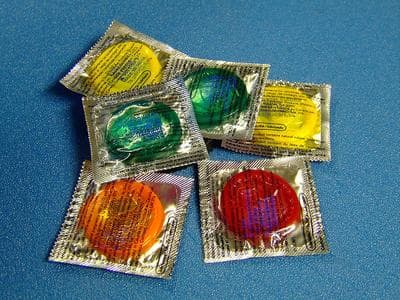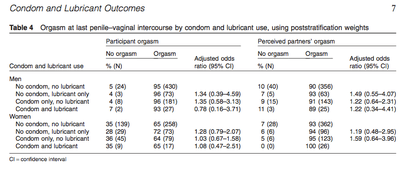Advertisement
News Flash: Sex With A Condom Still Fun, Study Finds

News Flash: Sex is fun — even with a condom.
That's the takeaway from a nationwide online sex survey of men and women ages 18-59, just out in the Journal of Sexual Medicine. When asked to quantify their pleasure quotient, both men and women rated their most recent sexual experience as quite high, in general, with few differences based on condom and lubricant use.
Notably, the new study, which included 1,645 respondents, didn't ask whether people preferred sex with or without a condom. It simply asked for a detailed accounting of a recent sexual encounter. So, among those who chose to use condoms (27.5% of men and 22.3% of women in the survey) the self-reported arousal rating and other key pleasure indicators appeared to be essentially comparable to non-condom users.
"Not everyone wants to or has to use a condom, or lubricant, when they have sex," the study's lead author, Debby Herbenick, Ph.D., MPH, with the Center for Sexual Health Promotion at Indiana University told me via email. "But if they want to use a condom or lubricant - to make sex safer or more comfortable - it's unlikely to have a significant impact on overall pleasure for many (but not all) people."
(I should say here that the study was funded by condom and vibrator maker Church & Dwight. This set off my skeptic's alarm bells; I asked Herbenick whether the company played any role in analyzing the data. She said that Church & Dwight "did not intervene in that way. Our team at Indiana University analyzed the data on our own, we wrote the papers, and we managed the review process directly with the Journal of Sexual Medicine where the study was published.")
Of course, conventional wisdom holds that sex is far hotter without a condom. See: Christian Grey on condom-free sex in "Fifty Shades Of Grey," p. 271:
"I scoot out of bed, too, and grab my sweatpants and a cami top, then sit back on the bed, cross-legged, watching him. I don't want him to go. What can I do?
"When is your period due?" He interrupts my thoughts.
What?
"I hate wearing these things," he grumbles. He holds up the condom, then puts it on the floor and slips on his jeans.
"Well?" he prompts when I don't reply, and he looks at me expectantly as if he's waiting for my opinion on the weather. Holy crap...this is personal stuff.
"Next week." I stare down at my hands.
"You need to sort out some contraception."
(Also, read this single guy's lament in which the author blames condoms for triggering "deflationary" erectile events.)
Finally, when I asked a few friends about this study their reactions were pretty consistent: "The experience is more enjoyable without a condom," was a recurring theme. Though one male friend said that wearing a condom so greatly decreased his anxiety about unwanted pregnancy and sexually transmitted diseases that it offered a different sort of pleasure.
To that, Herbenick replies:
The benefit of scientific research is that we have the chance to ask a wide range of people — in this case, a representative sample of the American public ages 18 to 59 — to rate their most recent sexual experience. It's not a convenience sample of friends, family, or colleagues, for example. It's a cross-section of America.
We also did not ask that "what do you prefer?" which is a very, very different question. People may prefer to not use a condom for reasons other than pleasure — some people, we know from scientific studies and from working as sex educators, may prefer to not use a condom because they want to have a baby, because it means they trust their partner or their partner trusts them, or because they like the physical sensation of ejaculating inside someone or being ejaculated in. That's a different question. What we did is ask people about their sexual experiences. We also asked if they used a condom or lubricant. Then we compared their ratings of pleasure, arousal, and whether or not they had an orgasm. This freed us from people's biases about condom use and allowed us to look more cleanly at pleasure and such.

The study analyzed data from the National Survey of Sexual Health and Behavior conducted during early 2009. This is familiar territory for Herbenick, a well-known researcher who focuses on human sexual behavior and related issues of sexual health, STI risk reduction, sexual pleasure and comfort. She writes: "We are also interested in the ways people have sex, including their use of products such as condoms and lubricants. In other research, we've also examined the use of sexual enhancement products such as vibrators and other sex toys." Lubricants were a focus of this study, Herbenick says because:
"...another large area of research, for me, relates to vaginal and vulvar health. Lubricant use can increase comfort and pleasure and reduce pain for women who experience it (and about 30% of women report pain during their most recent sexual event, even if just a little).
As for public health reasons, there are some. STIs are more easily transmitted through the blood stream. To the extent that the vagina experiences even very small tears during sex, there is an increased risk of STI transmission. Reducing friction/tearing through lubricant use can reduce the risk of STI."
In the current study participants were asked to report on their most recent sexual event in the past year and detail the types of behaviors that went on, for instance, oral sex, intercourse, etc. They were also asked about lubricant use. "Finally, participants were asked to rate their most recent sexual event in terms of their perceptions of pleasure, arousal, and orgasm (own and partner’s), as well as difficulties with pain or lubrication/erectile function," the study says.
Among men, this finding seemed to stand out: "Men who had sex without a condom or lubricant reported significantly greater arousal than men who used a condom without lubricant, but their arousal ratings were not significantly different from those using lubricant with or without a condom," researchers report.
However, overall, researchers report:
Arousal ratings were consistently high among all groups (4.21 or above on a scale of 1–5) and not significantly different among men who used lubricant only, a condom only, or both a condom and lubricant. Among women, no significant differences were noted in regard to arousal ratings based on condom or lubricant use...No significant differences in ratings of sexual pleasure were noted for either men or women based on condom or lubricant use; ratings were consistently high among each group...No significant differences were found in regard to men’s ratings of the ease of their erections based on condom and lubricant use...No significant differences were found in regard to men’s or women’s reports of their own orgasm or their perception of whether or not their partner had an orgasm, during their most recent sexual event in regard to condom or lubricant use...
In conclusion, the authors make this suggestion:
Sexual health professionals should take note of the generally high ratings of sexual arousal, pleasure, and ease of erections in all categories of condom and lubricant use. These data, from a nationally representative sample, demonstrate that sex — with or without a condom, and with or without lubricant — is typically highly arousing and pleasurable for most people. The data also show that condom use is not linked to lower ratings of sex (in spite of common myths that suggest condoms make sex less pleasurable) nor does lubricant use appear to be associated with less positive ratings of sex. That said, condom and lubricant use are also not linked with significantly higher ratings of sex in naturally occurring settings. Taken as a whole, it is likely that adult men and women are making choices about condoms and lubricants in deliberate ways that make sense for them.
In the end, sex is still, well, sex. And, as both Mel Brooks and Sharon Stone have said (or have been quoted saying): "Sex is like pizza. Even if it's done bad, it's still good."
This program aired on January 25, 2013. The audio for this program is not available.
